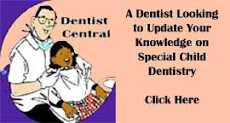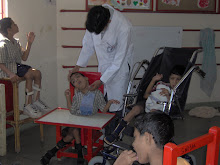
The drooling of saliva is an embarrassing situation for both patient and care giver. An accompanying condition, seen in many forms of Cerebral Palsy, drooling can not only reduce the quality of life of your child but also have an adverse psychological impact.
What is Drooling?
Drooling is the spilling of saliva onto the lips, chin or in severe cases even onto the child's clothing. Drooling in cerebral palsy is not due to the production of excess saliva, it is caused because the child's muscles do not allow for a proper swallow.
What are the effects of drooling?
Apart form the obvious social embarrassment, drooling can lead to a foul smell due to the accumulation of saliva in the corners of the mouth, soiling of the clothes and in very severe cases aspiration pneumonia. Aspiration pneumonia occurs when the lack of muscle coordination results in saliva entering the child's lungs. This saliva then acts as a source of infection that causes pneumonia. This condition can be life threatening.
Does drooling depend on the severity of CP?
To some extent it does. The worse the co-ordination between your child's nerves and muscles, the worse is the drooling. But surprisingly drooling has no correlation with the intelligence or learning ability of your child. Children who have no intellectual disability often suffer from drooling. This makes drooling a particularly embarrassing problem. Drooling may prevent children from making friends at school or prevent them from expressing themselves.
How can we treat drooling?
In Many cases the severity of drooling reduces with age, even completely regressing in a few cases. The primary aim of the treatment of drooling should be to improve the strength and co-ordination of the child's facial muscles. In many western countries, drugs or injections to reduce the flow of saliva have been tried. These methods are described as successful because they reduce the flow of saliva and thus improve the quality of life of the patient. However these drugs can have a devastating effect on the teeth of the child.
If not drugs then what?
Drugs are not the only form of treating drooling. Parents must remember that since drooling is a neuromuscular problem, it will often get better as your child's muscles get stronger. In many children the severity of drooling reduces with age. Therefore it is not advisable to start the child on medications early. Exercises to help the child achieve closure of the mouth greatly help reduce the severity of drooling. Speech therapy improves the child's control over the muscles of the tongue and also reduces the severity of drooling.
Will my child require surgery to control the problem?
Surgery is often viewed as a last resort, when all other treatment has failed, in order to prevent aspiration pneumonia. Surgery may be of two types, firstly the surgeon may reduce the secretion of saliva, by repositioning the duct of the salivary gland or by removing the gland itself. This reduces the production of saliva, but leaves the child's mouth prone to infection, as it is devoid of the protective nature of the saliva. The second, more complicated surgery, involves the bypass of the oral cavity during feeding, ensuring that the child is fed directly through a tube inserted into the stomach; a procedure called a gastrostomy. This type of surgery is reserved for children who have had multiple episodes of aspiration pneumonia and is the exception and not the rule.
What the future holds
The use of Botox for the management of drooling has been receiving a lot of attention in western countries. The drug more famous for its cosmetic uses, has a selective action on salivary glands. And even though it reduces the salivary flow, researchers claim that it is safer and has fewer side effects on the mouth than routinely used drugs.
Another interesting approach has been the use of oral appliances. Dentists often use the forces of the muscles to promote growth of the bones or help a child over come habits like thumb sucking. Research shows that modified versions of these appliances can promote muscle coordination in Cerebral Palsy. While they cannot be used in the severe forms of Cerebral Palsy, they are said to be effective in milder forms. They are especially useful in children with no intellectual disability, who can understand the purpose of the appliance.
For Further Queries you can contact me;
Dr Sharat Chandra Pani
Consultant Pediatric and Preventive Dentist
Senior Lecturer
KVG Dental College
Sullia India
+919886374024








No comments:
Post a Comment